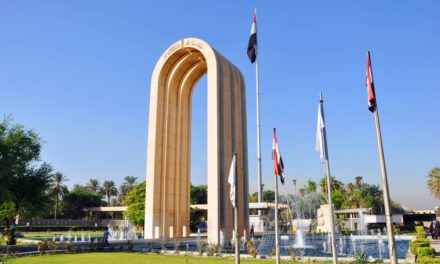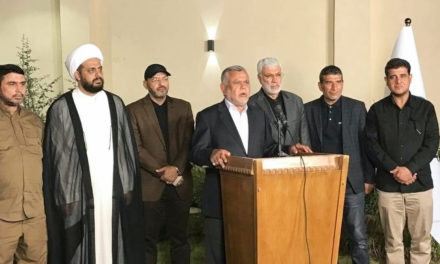The events over the last few days before the Mosul operation marked an unprecedented level of tension in the relationship between Iraq and Turkey. Despite various reasons for disputes, the relations between the two neighbours has been largely cordial since the establishment of the modern Iraqi state in 1921. But the different paths the two countries pursued regarding the Syrian crisis had a negative impact on the relationship. The emergence of ISIS and the suspicious Turkish position towards it, especially during and after the fall of Mosul pushed many Iraqis to drastically rethink their attitude towards Ankara.
Turkey’s relation with the newly founded modern Iraq got off to bad start. A bitter dispute over the Mosul vilayet, went all the way to a League of Nations fact finding mission. Despite that, Iraqi monarchs maintained a friendly relationship with the Turkish leadership. The relationship stayed clear of the political turmoil in the post-monarchy years, and ties gained strength during the time of former dictator Saddam Hussein, who allowed the Turkish military to shell Kurdish fighters, and even conduct ground operations against them inside Iraq. However, tensions dominated the relations after 1991 when Turkish bases were used during the liberation of Kuwait war and the enforcement of the northern no fly zone afterwards. These tensions were also exacerbated by emergence of Turkish plans to build several dams on the Tigris and Euphrates, threatening water levels reaching Iraq.
After 2003, and despite the continuation of Turkish incursions into Iraq and the commencement of construction works of major dams on the Tigris, the Shia led governments in Iraq chose to avoid confrontation with Turkey. Turkish goods flooded the Iraqi market, and Turkish companies were granted major contracts throughout the country. These strong bonds endured Turkish meddling in internal Iraqi politics, especially once US influence started to diminish. Turkey became a sponsor for certain Sunni blocs, most notably the Nujaifis and their allies. Turkey also facilitated KRG independent oil exports, in defiance of the position of Baghdad. The Iraqi government, and its leading political factions often voiced concern about these issues, but chose not to be confrontational.
However, the Syrian conflict changed things. Turkish support for Sunni Islamists (many of them extremists) opposing the Assad regime was seen as an existential threat to Iraq. Many of Turkish backed elements ended up fighting alongside ISIS, leading to popular calls to boycott Turkish goods in Iraq. When ISIS stormed entire Iraqi cities, and threatened Baghdad, Iraq’s worst concerns about the Turkish vision of the Syrian conflict were materialised, and the relationship took a new trajectory.
The appointment of Haider al-Abadi as a replacement for Nouri al-Maliki (despite the latter winning more seats in the Iraqi Parliament) was intended to be an attempt to ease Iraq’s tensions with Sunni neighbours. Abadi visited Turkey, and expressed interest in Turkish military assistance in training Iraqi forces preparing for the Mosul battle. Abadi got a lot more than he asked for, with Turkey sending ground troops and armoured vehicles 120km into Iraqi territory. Iraq voiced strong concerns behind closed doors, until the Turkish President Receb Tayyib Erdogan told Saudi TV that Mosul should be strictly for Sunnis. Understandably, this enraged Iraqi law makers of different backgrounds, resulting in a statement by Parliament describing Turkish military in Iraq as an “invasion.” It was backed by the prime minister and various elements of the Iraqi political spectrum, including Sunni Arabs and Kurds. Erdogan responded in a manner which made things even worse, personally insulting Iraq’s prime minister, raising major concerns inside Iraq about Turkish intentions. These concerns were fueled by Turkey’s history as a colonial state, particularly its illegal occupation of Northern Cyprus, and parallels started to be drawn with case of Mosul.
Turkey never fully accepted the League of Nations’ ruling regarding Mosul vilayet (current KRG, Mosul, and Kirkuk). Turkish officials of various levels occasionally bring up the issue, blaming the “biased” post WWI world order of cutting off Mosul from Turkey, despite being occupied by the British Army after announcing a truce. Today, if we list Turkey’s allies in Iraq, those at the top happen to be from the Mosul vilayet, most notably the KDP, the Nujaifis, and Sunni Turkomen. Turkey is the only country which opened a consulate in Mosul, which for some reason, remained in operation after ISIS took the city.
In 1974, Turkey occupied northern Cyprus following political turbulence in the Mediterranean island, using concern over the wellbeing of ethnic Turks as a pretext. Today, Iraq is not exactly stable, and concerns about Sunnis are mentioned almost whenever Erdogan talks about Iraq. One may say that international presence will be a barrier against a significant expansion of the current Turkish military deployment in Northern Iraq, but the heavy British military presence in Cyprus has largely tolerated the illegal Turkish occupation on Northern Cyprus.
While there are strong arguments against the possibility of a military invasion scenario, Iraqis have a full right to be very worried/suspicious about Turkish intentions for their second largest city. Since 2003, Iraq had way more than its fair share of external influences. An unstable Iraq sent negative ripples throughout the Middle East, opening old sectarian wounds, eventually culminating in the emergence of a terror group more extreme than al-Qaeda. Allowing Iraq to be subject to even more direct external influence will not only deepen intra-Islamic tensions, but will also provide momentum to Islamic terror groups, regionally and internationally. The best way to counterbalance Iranian influence in Iraq is through strengthening moderate elements within the Iraqi government. The liberation of Mosul is uniting Iraqis around their military forces, and the resulting momentum can give Iraq a fresh start. Turkish regional aspirations should not be allowed to turn a major victory against international terror into further fuel for terrorist ideology.

Ahmed Shames
Iraqi Political Analyst. Former Political Advisor to British Embassy and Press Officer at Iraqi PMO.










